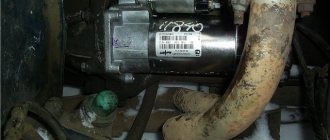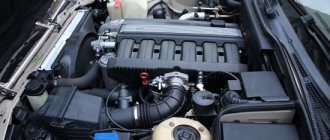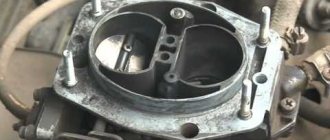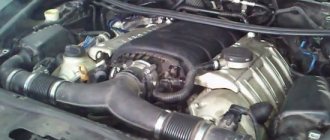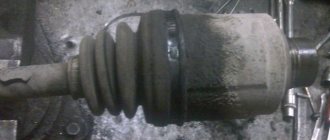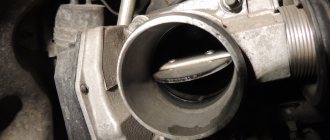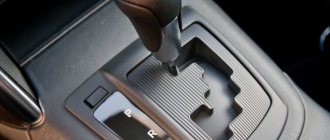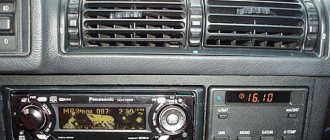Why does the car jerk?
There can be simply a huge number of problems due to which a car can drive jerkily (twitch), and they are individual for each car. These could be problems with the fuel system or transmission problems. Let's look at each of the reasons.
Fuel problems
Problems related to fuel supply to the engine.
Gasoline pump
All cars with injection engines are equipped with a fuel pump that pumps pressure into the fuel system. The normal operating pressure of the pump reaches 10 kg/cm³. Over time, the pump may lose its former power due to aging or dirty filters, fine and coarse fuel cleaning, which will undoubtedly lead to a loss of pressure and improper operation of the internal combustion engine.
Injectors
Another important indicator in the fuel system is the injectors. They spray fuel into the engine cylinder head, mixing it with air and feeding it into the combustion chamber. Over time, the injector nozzle becomes clogged with dirt and carbon deposits, which contributes to incorrect and even insufficient fuel atomization, which leads to uneven operation of the entire internal combustion engine.
Ignition problems
Problems associated with the formation of a spark in the engine.
Candles
To ignite the fuel mixture in a car, spark plugs are used, which produce sparks in the combustion chamber, thereby igniting the air-fuel mixture. Over time, due to the low quality of fuel, which is abundant in the vast expanses of the Russian Federation, spark plugs become covered with soot or, due to exposure to high temperatures, change their gap, which leads to improper operation of the internal combustion engine.
Wires
Spark plug wires also play an important role in engine operation; they transmit high voltage from the coil to the spark plug. The insulation of these wires is made of silicone and, under the influence of high temperatures and time, is subject to drying out and, consequently, cracks. High voltage, passing through a wire with a crack, can make its way to the body and thus does not even reach the spark plug, this is especially noticeable at high speeds and when the car is running under load.
Reels
The ignition module is the element that produces a spark to the cylinders; when it fails, the cylinders fail, but it often happens that the module can turn off due to temperature or load. By the way, the ignition module is no longer available in more modern cars; it was replaced by individual ignition coils, which helped get rid of wires and their problems. The IKZ is put directly on the spark plug and produces a spark for exactly one cylinder in which it is installed.
Transmission problems
Problems related to the gearbox, drives and wheels.
checkpoint
The gearbox is responsible for moving the car. Breakdowns are possible very often, especially if it is a rather complex automatic transmission, in which you have to frequently change the oil and monitor its quality. Failures in the gearbox can be in bearings, shafts, or clutches.
Drive
Car drives or cardans, which transmit rotation from the gearbox to the wheels, can also be the reason why the car jerks. Wear of constant velocity joints can create backlash between the gearbox and the wheel, which will lead to jerking. It’s the same with the cardan transmission, whether it’s on a crosspiece or a CV joint, its wear promises knocks and jerks.
Wheels
Wheels that have uneven wear, namely ellipse, can create jerks on the car when it moves at a certain speed, this is most noticeable on a flat road at a speed of 40 km/h.
Fuel starvation
Jerking during acceleration can be a sign of problems along any part of the entire fuel supply route from the tank to the engine. The internal combustion engine is sensitive to depressurization of the fuel line and problems of fuel leakage from it. Damage to the fuel line can lead not only to the fact that when you sharply press the gas, the car does not react immediately, but even to a fire or explosion. Therefore, a smart first step in diagnosing fuel starvation is to inspect the area under the car for fuel leaks.
The smell of gasoline in the cabin or trunk should also arouse suspicion.
Checking the filter and tank
The fuel filter is responsible for cleaning gasoline before it enters the injection system. It may be clogged with debris, dirt and other particles from the tank or fuel particles. Usually the filter is attached inside the engine compartment on the main line before the mixture formation system. If there is no certainty regarding the date of its last replacement, then a clogged filter as a possible cause of jerks during acceleration should be considered more carefully. To understand whether this is the problem, you need to:
- Physically inspect the fuel filter. If it is visually obvious that it is dirty, then its obstruction is likely causing a restriction in the flow of fuel to the engine.
- Check for leaks at the joints where the fuel lines are spliced with the filter housing. It is not uncommon for connections to loosen before the system depressurizes.
You may also be interested in: How much does it cost and how to paint a car?
If these problems are found, the fuel filter should be replaced and the threads on the connections should be tightened.
Then make sure that the leak has stopped and test the engine again. In some cases, the tank ventilation system may become clogged. The problem is invisible when the tank is full, but when it is empty it can manifest itself as failures during acceleration.
Troubleshooting pump problems
The fuel pump in a modern car is most often of a submersible type and runs on an electric drive. Its task is to pump fuel out of the tank and push it through the fuel lines in the desired direction. Opening the throttle valve entails an increase in fuel consumption. Accordingly, the pump in this case increases the pressure to satisfy the engine's gasoline needs.
Problems with the pump can cause jerking when accelerating. As a rule, such symptoms indicate the first signs of wear and tear.
Analyzing and troubleshooting fuel pump problems will require professional diagnostic equipment to scan and interpret error codes. Or you will have to remove the pump and check its operation. If it is suspected of being faulty, a complete replacement is recommended.
Summarizing
So, the main reasons for a car jerking during acceleration are listed above. Let us add that in turbocharged engines it often appears due to a defective turbine. In particular, incorrect pressure regulation due to a bad solenoid valve or a non-functioning electronic actuator. Which is solved by replacing the component in the first case and the entire assembly in the last.
Thus, when you twitch by pressing the gas, you should start checking with the power supply, weeding out serviceable elements and smoothly moving to the main computer. It takes time to work independently and you need to have a good understanding of automotive systems. But why rack your brains when you can turn to trained professionals for help? A convenient solution is the Uremont online platform. One resource where you can immediately access all car services nearby within Russia, Kazakhstan and Belarus.
Source
Other reasons
The reasons why a car jerks when accelerating is not always in the engine. This is sometimes related to the clutch function on manual transmission vehicles. For example, the clutch disc may be worn or warped. A faulty release bearing manifests itself in a similar way. Some craftsmen do clutch repairs themselves, but for most drivers such work will require additional knowledge.
You may also be interested in: How to order a tow truck inexpensively
Malfunctions of the on-board electronics also manifest themselves in uneven operation of the engine in some modes. Sometimes the engine control unit or other electronic component malfunctions. In most cases, a simple software reboot is sufficient to restore engine control systems to functionality.
Poor voltage on the on-board network is not a very common diagnosis for failures in acceleration, but sometimes this is the reason. The generator's job is to create the necessary voltage while the engine is running. Like any other mechanism, it is subject to wear and tear, which leads to loss of productivity. Voltage drops affect the operation of the fuel pump and ignition system.
Adverse weather conditions can also cause jerking when accelerating. Humidity and temperature changes during the cold season provoke the formation of condensation on contact groups and in the housings of electronic components. Older cars equipped with a mechanical distributor are especially sensitive to weather.
Fogging of its cover leads to sparking in the distributor itself, and not on the spark plug. Misfires manifest themselves jerkily while driving.
The obvious way to prevent this is to leave the car in drier, warmer areas. If such storage is not possible, then the only way to get rid of condensation is to dry the inside of the distributor cover.
Car jerking when accelerating
Finding the reason for the “jerky” movement of a car is sometimes difficult even for experienced craftsmen, but there are characteristic breakdowns, and diagnostics should begin with the most basic things. No matter how trite it sounds, but first of all, on a car with a gasoline engine, it is worth checking the condition of the spark plugs; it is because of them that the car often jerks while driving, especially during acceleration.
A working spark plug (SZ) should not have:
Also, when removing spark plugs, it will not be superfluous to pay attention to the gaps between the electrodes; on average, they should be approximately 0.7 to 1.2 mm. It is important here that the gaps are not too large or small, and it is also important that the spark plug that was just removed is not damp. If the SZ is wet (in gasoline), first of all you need to try to change it. You should also change the entire set of spark plugs if the electrodes are too thin or burnt out.
Car jerking when accelerating is mainly due to engine interruptions; there are many different causes of malfunction; the most common breakdowns are:
The throttle valve may also be clogged; it quickly becomes clogged with soot when refueling the car with low-quality gasoline, and it should be noted that with many of the characteristic breakdowns listed above, the engine will operate unstably at low speeds.

